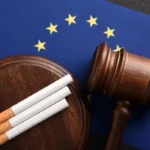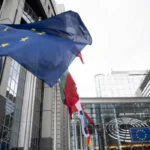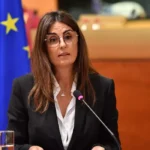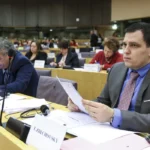The notion of “soft power” is commonly perceived as being the responsibility of one State independently of the others. However, the idea of a “European soft power” is widespread today among political scientists and geopoliticians but still contested by part of the general public, would the EU have managed to transmit to the rest of the world the image of a homogeneous union of nations?
The origin of the “European” soft power theory
One of the founding fathers of the European Union, Robert Schuman wrote in his book For Europe “Europe, before being a military alliance or an economic entity, must be a cultural community in the most high of this term”. Soft power is a notion developed by the theorist and political scientist Joseph Nye. for the latter, it is the power of influence that a state exercises over others through non-coercive means such as culture, diplomacy or institutions. It is therefore opposed to hard power which is, still according to Joseph Nye, the use by a State of its military power or economic sanctions to impose its domination or defend its interests. Soft power is thus a concept that is part of the cultural and commercial strategy of each country.
France, for example, aware of the advantage of its cultural influence on the international scene, has developed since 1883 a network of Alliances Françaises throughout the world. In 140 years, more than 800 Alliances Françaises have opened their doors to spread and teach French culture and language abroad.
Soft power then appears as a concept which, by definition, involves the will of each State. Culture is the DNA of a country, which contributes mainly to the feeling of belonging of its inhabitants.
But how can we then speak of European soft power? The European commission has every interest in playing its cards on the side of soft power, indeed one of the driving pillars of European construction is the defense of common values, in the lead democracy and human rights.
The “normative power” of the EU: a key asset for standing up to international economic players
The concept of “Europe as a normative power” was developed by Ian Manners, a British scholar specializing in international relations. He explored how the European Union (EU) exerts its influence not only as an economic and political power, but also as a normative one, by promoting its values, norms and practices in international relations.
An example. In 2016, the European Parliament and the Council voted on the GDPR regulation (General Data Protection Regulation) which came into force two years later. The latter aims to regulate the data protection of EU residents. This regulation is a victory for European diplomacy, proof that it can prevail against the giants GAFA, the main international economic and technological players.
The ability of the EU to impose its laws beyond its borders is also known as the “Brussels effect”. This phenomenon is remarkable as it is rare for the EU to win against the United States. The latter had opposed the Kyoto Protocol, the Rome Statute establishing the International Criminal Court and withdrawn from the Paris agreements under Donald Trump. Another example, and still in the field of new technologies, the EU has imposed the single charger since the vote of June 7, 2022. The text will be applied at the end of 2024 imposing on Apple, an American company, the USB-C type port to access the European market.
With more than 400 million potential consumers, the EU weighs in on international trade decisions. This constitutes a fundamental aspect of European soft power, which is based on its relatively well-to-do population in view of the world situation.
Erasmus: the birth of a common sense of belonging to the EU
One of the most tangible manifestations of the will to establish within the Union a sense of belonging to a community is probably the Erasmus programme. This is a crucial element for the development of soft power in Europe.
Erasmus was launched in 1987 and had already planned to encourage university exchanges between member countries, to strengthen European unity. The students thus had the opportunity to extend the scope of their experiences abroad by discovering the extent of European territories. This program has also greatly contributed to the knowledge of other European cultures by the Europeans themselves. The success was such that other countries were inspired by it elsewhere in the world. An example is the Asia-Pacific Academic Exchange Program (ASEP), launched in 1997 by the Association of Southeast Asian Universities (AUN) to promote student mobility between ASEAN countries . ASEP is the first regional exchange program in the region. Similarly, other parts of the world have implemented similar programs, such as the Fulbright program in the United States, the Chevening program in the United Kingdom, the DAAD program in Germany, and many others.
Erasmus’ impact has been so significant that it is often considered the pioneer of international exchange programs and has served as a catalyst for the development of similar programs around the world. He showed the benefits of student mobility and academic cooperation in building a more open, inclusive and interconnected global support.
Finally, in 2014 a more ambitious version of Erasmus was launched: Erasmus+. This opens the doors of the program beyond European borders and extends its skills to education and training in the broad sense.
The influence of Europe: cultural and intellectual center
Europe is the most attractive continent for international tourists. In 2017, the continent brought together half of the world’s tourism, or 650 million people according to the World Tourism Organization (UNWTO). These figures can be explained by the cultural and natural wealth in Europe.
Among these many tourists, the vast majority were Europeans, they were indeed more than 600 million. Intra-European travel is very frequent due to geographical proximity, free movement agreements in the Schengen area and the diversity of attractive destinations in Europe. Europeans are therefore the main driver of tourist activity in Europe.
But Europe can also count on its international influence to attract globetrotters from other regions. This is where the importance of symbols comes in, essentials to visit on the continent. We think in particular of the Sagrada Familia in Barcelona, the Colosseum in Rome, the Acropolis in Athens or the Eiffel Tower in Paris.
The importance of tourism for the economy varies from country to country, in 2019 the UNWTO estimated that tourism represented on average 10% of GDP in Europe. The post-covid situation reinforces the role of tourism in the recovery of economies, as noted in the 2022 edition of the World Economic Situation and Prospects report established by the UN.
In short, European soft power is indeed a reality of which the EU institutions have become aware. Even if at first glance the formula may seem exclusive to national use, the Member States are stronger by cooperating together, to be able to compete with the Chinese and American giants. The role of the EU in the area of culture is clear: in particular, it supports the cultural policies of countries, creates a commercial and fiscal environment conducive to their development, encourages cultural cooperation between countries, and helps them preserve their heritage. Joseph Nye also states about Europe that “the soft power of the European Union should not be based on the creation of a new culture, but rather on the observation of the already transnational dimension of European culture. »
This article is originally published on taurillon.org







